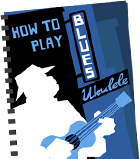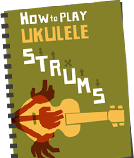Jake Wildwood – I Will Follow (MP3)
Jake Wildwood – Orion’s Belt (MP3)
Jake Wildwood – Kansas James (MP3) from Home to Be
Jake Wildwood – Undine (MP3) from Queen Anne’s Lace
If you’ve been following the blog a while, you’ll be familiar with Jake Wildwood already. I’ve featured his YouTube videos on a number of occasions and co-opted him into answering ukulele repair questions way beyond my knowledge. As well as repairing and restoring instruments in idyllic Vermont and blogging about the vintage instruments he repairs, he’s found the time to record his latest album, Home to Be, that you can download for free on his website. I caught up with Jake to ask him a few questions.
What are the lyrical themes of the new record?
I think moving, separation from friends, love of life, acceptance of death, and the strength of love all play out through these songs. All of them, to me, are driven by our move from hectic Providence, RI to pastoral Rochester, VT. Home to Be was the first song I wrote since moving — we have a river right out our front windows, and the wind whips through the valley in winter, so it felt right that we were borne along to our new life on the back of the north wind.
Other songs like Bear Cubs, Orion’s Belt, and Bird on the Wing are pretty much open appeals for people to show their better rather than their worse sides.
Kansas James is the spookiest one for me. I had a (remarkably coherent) dream one Friday night that John Wayne was in “my cabin” (what cabin??) somewhere out west and he told me his story (that is, the one of the cowboy whose sister is killed in the song). I immediately wrote it down when I woke up and it became the song, complete with the chorus that references /Big Rock Candy Mountains/. Well, a few hours later, a friend calls us up to tell us another friend’s brother has been murdered in Boston. Sometimes I get the feeling that overtones are channeled via people who know one another over long, long distances.
There are plenty of references to nature on this album how much does your environment influence the songs you write?
You’re right on the mark with that question! Environment is what focuses the sound and subject of my music dramatically. I think places and the feeling of certain places is extremely important to anchor a song in reality.
Nature figures largely in my songs because it’s lasting, tangible, and a clear signifier of “good” in the world, at least for me. Nature in my songs is often written in direct contrast to what people do to each other and the world in general — people are constantly at odds with their consciences, beliefs, and ideals just as they are at odds with what lets them live their lives in the first place. Many of my songs are reflective on these contrasts.
What connects with you about the old songs and styles?
Oh, hmm. I’m a closet historian, for one thing, so I’m always in search of older and older recorded music. I don’t consider my songs true old-time songs or folk songs, though a lot of my techniques are somewhat borrowed from old styles that I enjoy.
I think what most connects me to older American music is that the sounds and ideas you hear in it are closely tied to the landscape and people’s day-to-day struggles — which often run straight down a river of history right to our times, today.
A lot of folks think of “old-time” as a handful of tunes that’ve been played-out and a lot of old ideas that can’t make anything new. I understand that assumption as a lot of modern old-time and traditional musicians shun deviation from a few particular styles and a big box of similar tunes as if anything outside of their little house is against their “bible” — but as a student of musical history, especially early American music in various styles, I can easily say that a lot of what’s considered “traditional” now was very new and very much alive and changing back then.
I guess what I’m trying to get at is that I really value our musical legacy as a people and see no problem in continuing it to make new songs and interpret different styles in different ways.
How did you get into instrument repair?
That’s an easy one! I used to take apart guitars, fix them, and sell them as a hobby, and as a way to fund purchases of new gear. Arriving in Vermont, with a bunch of my grandpa’s old tools, and needing to make work for myself, I set out to make my own job doing something that relates to my different passions — music, history, and working with my hands.
What’s the best uke you ever played?
They don’t exist. After working on a zillion ukes I can say that I appreciate good, light construction, but that I’m especially excited to see how so many older makers made fantastic ukes with widely varying sound — all of them great to play and hear, and all suitable to different situations and different players. I own my favorite one: a c.1920 Regal built all out of koa, with a sweet, powerful, and bell-like tone — perfect for banjoey fingerpicking. My favorites after that, and significantly more “professional” in terms of build-style and looks, are a c.1925 Lyon & Healy “American Conservatory” concert-scale banjo uke and a c.1920 unmarked koa soprano with rope binding that I just sold recently. That last one had a very nice bright, but full sound.
You seem like quite a prolific songwriter. How do you keep the ideas coming?
Oh, yes, I have to admit I have a bad habit of writing a lot. I have a lengthy back-catalog of songs that I have on my “to be recorded” list. I think in the last couple years alone I’ve written about 150+ songs, some better than others, some half-finished and waiting. I think that for a songwriter who really loves his or her craft and respects it, one can’t help but keep writing. Every moment of your life when you interact with anyone else, bits and pieces of what can be songs eventually, fall into place. Every time you ask yourself: why do I think this? Why are things this way? What’s really going on here? — is a chance to write a song. Looking at the world with wide eyes, and coming to respect everything in it, and especially your fellow peoples’ lives and your own life, means that there’s fertile creative ground on every inch of soil around you.
Songwriting for me is also therapeutic — I tend to write songs when I’m trying to understand myself or someone else and what I’m thinking about or they’re thinking. Some people can get a little cross with me when they see themselves in a song of mine, but like as not I wrote the song about myself! Humans are treasure chests of strange contrasts — and I wouldn’t have it any other way.
I loved your Queen Anne’s Lace EP, any plans to do more electric stuff?
I always plan to do more electric but it hardly ever pans out. Wood and wire is where my heart’s at and inevitably songs get recorded in the manner that I wrote them. I do have a bunch of older songs collecting moss, though, and have been planning to record them in the manner that I wrote (and used to perform) them: an electric guitar, a bit of reverb, and two mics — one with some echo. I’ve even got a title I’ve been meaning to use: Jake Wildwood Sings the Songs of His Youth.
What can we expect from you in the future?
In the near future I have two albums I really, really want to work on: one will be shorter, like /Home to Be/, and entirely made up of a set of songs I wrote on a single cold night in December, each one about a particular tree, bush, shrub, flower, that I’ve come to know up here. The other one will be full of the many more recent songs that I felt didn’t fit with the feel of Home to Be. Both albums I’m planning to play a bunch of different instruments on each song, and uke will weave in and out of forefront and background. In fact, as far as the “green” album goes, I penned the tune for each of the songs on a re-entrant baritone uke, which was a nice change of pace.
Download Home to Be free on JakeWildwood.com and visit his instrument repair blog
.



“I think in the last couple years alone I’ve written about 150+ songs…”
Holy Moses! I haven’t written that many songs altogether.
For the Snake Suspenderz new CD I wrote or co-wrote about a half-dozen over a one-month period and that was probably the most I’ve written in that short of time ever.
I bow to the real songwriters, like Jake, out there!